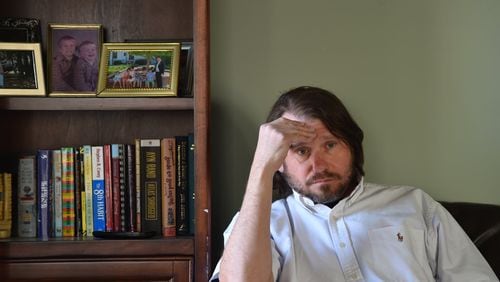Five years ago this month, Robb Lawson shared a secret he’d held for more than 30 years, a decision made in part to force accountability on those responsible for his anguish.
A former Scoutmaster sexually abused him, he said.
The Boy Scouts of America, facing nearly 90,000 such claims from former Boy Scouts across the country, has released a reorganization plan with the U.S. Bankruptcy Court in Delaware that includes a settlement offer averaging around $6,000 per plaintiff.
“It’s insulting,” said Lawson, who serves on the survivors’ Torts Claimant Committee, a nine-person committee appointed by the Department of Justice to represent the victims’ interest in the Boy Scouts’ Chapter 11 case. He has been immersed in negotiations with the BSA for the past year and said the TCC will oppose their plan in court.
“It’s not a good faith starting point,” said Lawson, 50, who who alleges a former Gainesville Scout leader, Fleming Weaver, raped him more than three decades ago. Lawson said the attack occurred in 1985, four years after Weaver had admitted to abusing two boys under his supervision as Troop 26′s scoutmaster. Weaver would later confess to sexually abusing at least “five or six boys” during his time in Scouts. He has declined multiple requests from the AJC for comment over the years.
The reorganization plan submitted by the BSA includes a $300 million contribution from the Boy Scouts’ local councils — roughly 250 nationwide — into a trust for victims. Attorney Paul Mones, who obtained a $19.9 million verdict against the Boy Scouts in 2010, said the local councils, which operate independently from the national office, are under no obligation to participate.
“They can do whatever the hell they want,” said Mones, who represents Lawson and other members of the claimants committee. “The $300 million figure is aspirational.”
The Boy Scouts sought bankruptcy protection in February 2020. The organization says it needs $75 million to survive; any earnings above that will go into the survivors fund, according to the reorganization plan. That includes BSA’s collection of Norman Rockwell paintings, along with properties in North Carolina, Texas and oil and gas interests across the U.S.
In a statement, the BSA says the plan “demonstrates that considerable progress has been made as we continue to work with all parties toward achieving our strategy to provide equitable compensation for victims and address our other financial obligations so that we can continue to serve youth for years to come.”
The plan continues a long pattern of the BSA shirking their responsibilities to victims, Mones said. It would essentially require survivors to engage with insurance companies, in long, drawn-out court battles, to obtain compensation for their pain and suffering, he said.
Tancred Schiavoni, an attorney for one of the BSA insurers, Century Indemnity, said in a statement the court “needs to first implement a process to root out the bad claims generated by for-profit claims aggregators and misleading advertising campaigns.”
His client supports victims being compensated fairly “but this plan doesn’t get us there,” Schiavoni said in a statement.
Negotiations between the Boy Scouts, insurers and the TCC will continue. Mones said they won’t get very far as long as the BSA continues to skirt its responsibilities to survivors.
“No one should be surprised by this,” he said. “This continues a long pattern of arrogance by the Scouts.”
Lawson said the BSA has been slow to turn over information, making it difficult to get a read on the extent of their financial holdings.
Mones said if the BSA was serious they’d sell off some of their more lucrative real estate properties, such as Philmont Ranch in New Mexico. The property includes 140,177 acres of wilderness in the Sangre de Cristo Mountains of the Rocky Mountains.
The Boy Scouts say they can’t sell those properties due to agreements with donors. Mones said they just don’t want to give up the land. His 2010 court triumph led to the release of the “perversion files” chronicling sexual abuse inside the 110-year-old organization. But the confidential documents covered only a 20-year period, from 1965 to 1985, and the BSA fought the release of additional files.
The Boy Scouts said its reorganization offer is not final.
“In the coming months, supplements to the plan will include a more detailed breakdown of the process to compensate survivors and more details about how local councils will support this effort,” the organization’s statement read.
About the Author







